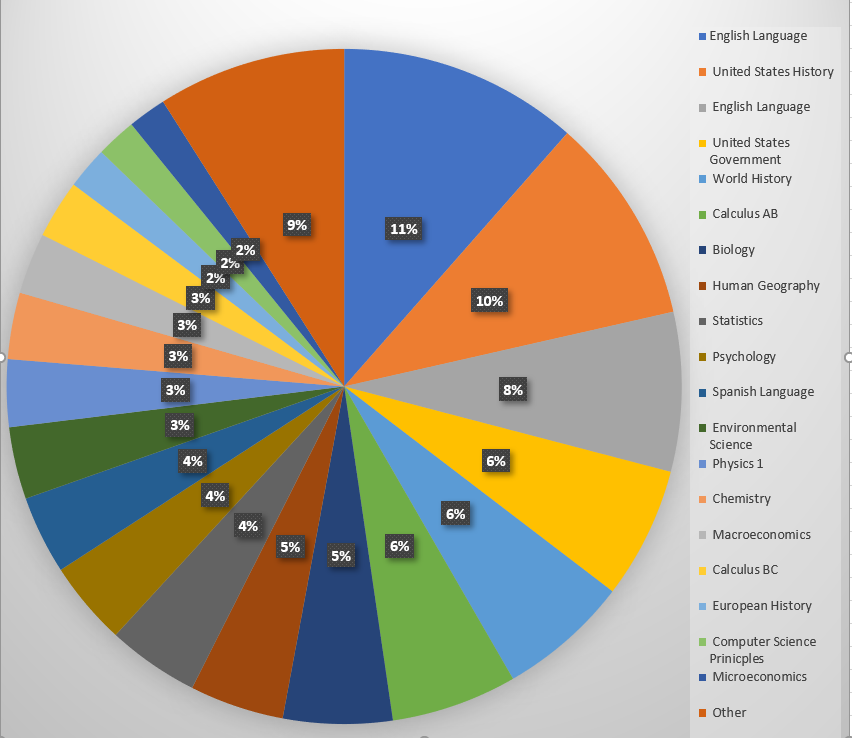|
AP Human Geography
Advanced Placement (AP) Human Geography (also known as AP Human Geo, AP Geography, APHG, AP HuGe, AP HuG, AP Human, or HGAP) is an Advanced Placement social studies course in human geography for high school students in the US, culminating in an exam administered by the College Board. The course introduces students to the systematic study of patterns and processes that have shaped human understanding, use, and alteration of Earth's surface. Students employ spatial concepts and landscape analyses to analyze human social organization and its environmental consequences while also learning about the methods and tools geographers use in their science and practice. Exam The AP Human Geography Exam consists of two sections. The first section consists of 60 multiple choice Multiple choice (MC), objective response or MCQ (for multiple choice question) is a form of an objective assessment in which respondents are asked to select only correct answers from the choices offered as a list. ... [...More Info...] [...Related Items...] OR: [Wikipedia] [Google] [Baidu] |
Advanced Placement
Advanced Placement (AP) is a program in the United States and Canada created by the College Board which offers college-level curricula and examinations to high school students. American colleges and universities may grant placement and course credit to students who obtain high scores on the examinations. The AP curriculum for each of the various subjects is created for the College Board by a panel of experts and college-level educators in that field of study. For a high school course to have the designation, the course must be audited by the College Board to ascertain that it satisfies the AP curriculum as specified in the Board's Course and Examination Description (CED). If the course is approved, the school may use the AP designation and the course will be publicly listed on the AP Course Ledger. History After the end of World War II, the Ford Foundation created a fund that supported committees studying education. The program, which was then referred to as the "Kenyon Plan", ... [...More Info...] [...Related Items...] OR: [Wikipedia] [Google] [Baidu] |
Human Geography
Human geography or anthropogeography is the branch of geography that studies spatial relationships between human communities, cultures, economies, and their interactions with the environment. It analyzes spatial interdependencies between social interactions and the environment through qualitative and quantitative research methods. History Geography was not recognized as a formal academic discipline until the 18th century, although many scholars had undertaken geographical scholarship for much longer, particularly through cartography. The Royal Geographical Society was founded in England in 1830, although the United Kingdom did not get its first full Chair of geography until 1917. The first real geographical intellect to emerge in the United Kingdom was Halford John Mackinder, appointed reader at Oxford University in 1887. The National Geographic Society was founded in the United States in 1888 and began publication of the ''National Geographic'' magazine which became, and con ... [...More Info...] [...Related Items...] OR: [Wikipedia] [Google] [Baidu] |
College Board
The College Board is an American nonprofit organization that was formed in December 1899 as the College Entrance Examination Board (CEEB) to expand access to higher education. While the College Board is not an association of colleges, it runs a membership association of institutions, including over 6,000 schools, colleges, universities, and other educational organizations. The College Board develops and administers standardized tests and curricula used by K–12 and post-secondary education institutions to promote college-readiness and as part of the college admissions process. The College Board is headquartered in New York City. David Coleman has been the CEO of the College Board since October 2012. He replaced Gaston Caperton, former Governor of West Virginia, who had held this position since 1999. The current president of the College Board is Jeremy Singer. In addition to managing assessments for which it charges fees, the College Board provides resources, tools, and service ... [...More Info...] [...Related Items...] OR: [Wikipedia] [Google] [Baidu] |
Earth
Earth is the third planet from the Sun and the only astronomical object known to harbor life. While large volumes of water can be found throughout the Solar System, only Earth sustains liquid surface water. About 71% of Earth's surface is made up of the ocean, dwarfing Earth's polar ice, lakes, and rivers. The remaining 29% of Earth's surface is land, consisting of continents and islands. Earth's surface layer is formed of several slowly moving tectonic plates, which interact to produce mountain ranges, volcanoes, and earthquakes. Earth's liquid outer core generates the magnetic field that shapes the magnetosphere of the Earth, deflecting destructive solar winds. The atmosphere of the Earth consists mostly of nitrogen and oxygen. Greenhouse gases in the atmosphere like carbon dioxide (CO2) trap a part of the energy from the Sun close to the surface. Water vapor is widely present in the atmosphere and forms clouds that cover most of the planet. More solar e ... [...More Info...] [...Related Items...] OR: [Wikipedia] [Google] [Baidu] |
Multiple Choice
Multiple choice (MC), objective response or MCQ (for multiple choice question) is a form of an objective assessment in which respondents are asked to select only correct answers from the choices offered as a list. The multiple choice format is most frequently used in educational testing, in market research, and in elections, when a person chooses between multiple candidates, parties, or policies. Although E. L. Thorndike developed an early scientific approach to testing students, it was his assistant Benjamin D. Wood who developed the multiple-choice test. Multiple-choice testing increased in popularity in the mid-20th century when scanners and data-processing machines were developed to check the result. Christopher P. Sole created the first multiple-choice examination for computers on a Sharp Mz 80 computer in 1982. It was developed to aid people with dyslexia cope with agricultural subjects, as Latin plant names can be difficult to understand and write. Structure Multipl ... [...More Info...] [...Related Items...] OR: [Wikipedia] [Google] [Baidu] |
Secondary Education In The United States
Secondary education in the United States is the last six or seven years of statutory formal education, including or (varies by states and sometimes by district) through . It occurs in two phases. The first is the ISCED lower secondary phase, a middle school or junior high school for students through . The second is the ISCED upper secondary phase, a high school or senior high school for students through . There is some debate over the optimum age of transfer, and variation in some states; also, middle school often includes grades that are almost always considered primary school. History High school enrollment increased when schools at this level became free, laws required children to attend until a certain age, and it was believed that every American student had the opportunity to participate regardless of their ability. In 1892, in response to many competing academic philosophies being promoted at the time, a working group of educators, known as the "Committee of Ten" wa ... [...More Info...] [...Related Items...] OR: [Wikipedia] [Google] [Baidu] |
High School Course Levels
High may refer to: Science and technology * Height * High (atmospheric), a high-pressure area * High (computability), a quality of a Turing degree, in computability theory * High (tectonics), in geology an area where relative tectonic uplift took or takes place * Substance intoxication, also known by the slang description "being high" * Sugar high, a misconception about the supposed psychological effects of sucrose Music Performers * High (musical group), a 1974–1990 Indian rock group * The High, an English rock band formed in 1989 Albums * ''High'' (The Blue Nile album) or the title song, 2004 * ''High'' (Flotsam and Jetsam album), 1997 * ''High'' (New Model Army album) or the title song, 2007 * ''High'' (Royal Headache album) or the title song, 2015 * ''High'' (EP), by Jarryd James, or the title song, 2016 Songs * "High" (Alison Wonderland song), 2018 * "High" (The Chainsmokers song), 2022 * "High" (The Cure song), 1992 * "High" (David Hallyday song), 1988 * "Hi ... [...More Info...] [...Related Items...] OR: [Wikipedia] [Google] [Baidu] |
Human Geography
Human geography or anthropogeography is the branch of geography that studies spatial relationships between human communities, cultures, economies, and their interactions with the environment. It analyzes spatial interdependencies between social interactions and the environment through qualitative and quantitative research methods. History Geography was not recognized as a formal academic discipline until the 18th century, although many scholars had undertaken geographical scholarship for much longer, particularly through cartography. The Royal Geographical Society was founded in England in 1830, although the United Kingdom did not get its first full Chair of geography until 1917. The first real geographical intellect to emerge in the United Kingdom was Halford John Mackinder, appointed reader at Oxford University in 1887. The National Geographic Society was founded in the United States in 1888 and began publication of the ''National Geographic'' magazine which became, and con ... [...More Info...] [...Related Items...] OR: [Wikipedia] [Google] [Baidu] |
Geography Education In The United States
Geography (from Greek: , ''geographia''. Combination of Greek words ‘Geo’ (The Earth) and ‘Graphien’ (to describe), literally "earth description") is a field of science devoted to the study of the lands, features, inhabitants, and phenomena of Earth. The first recorded use of the word γεωγραφία was as a title of a book by Greek scholar Eratosthenes (276–194 BC). Geography is an all-encompassing discipline that seeks an understanding of Earth and its human and natural complexities—not merely where objects are, but also how they have changed and come to be. While geography is specific to Earth, many concepts can be applied more broadly to other celestial bodies in the field of planetary science. One such concept, the first law of geography, proposed by Waldo Tobler, is "everything is related to everything else, but near things are more related than distant things." Geography has been called "the world discipline" and "the bridge between the human and t ... [...More Info...] [...Related Items...] OR: [Wikipedia] [Google] [Baidu] |



